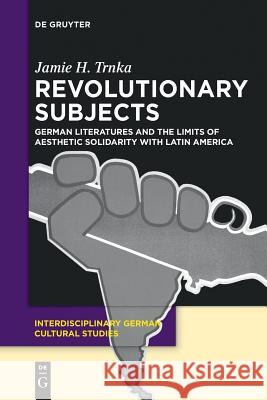Revolutionary Subjects: German Literatures and the Limits of Aesthetic Solidarity with Latin America » książka
Revolutionary Subjects: German Literatures and the Limits of Aesthetic Solidarity with Latin America
ISBN-13: 9783110553031 / Angielski / Miękka / 2017 / 330 str.
Revolutionary Subjects: German Literatures and the Limits of Aesthetic Solidarity with Latin America
ISBN-13: 9783110553031 / Angielski / Miękka / 2017 / 330 str.
(netto: 80,93 VAT: 5%)
Najniższa cena z 30 dni: 84,98
ok. 30 dni roboczych
Bez gwarancji dostawy przed świętami
Darmowa dostawa!
The series publishes monographs and edited volumes that showcase significant scholarly work at the various intersections that currently motivate interdisciplinary inquiry in German cultural studies. Topics span German-speaking lands and cultures from the 18th to the 21st century, with a special focus on demonstrating how various disciplines and new theoretical and methodological paradigms work across disciplinary boundaries to create knowledge and add to critical understanding in German studies. The series editor is a renowned professor of German studies in the United States who penned one of the foundational texts for understanding what interdisciplinary German cultural studies can be. All works are peer-reviewed and in English. Three new titles will be published annually. About the series editor:
Irene Kacandes is the Dartmouth Professor of German Studies and Comparative Literature at Dartmouth College, Hanover, New Hampshire. She received three degrees from Harvard University and also studied at the Free University of Berlin and Aristotle University in Thessaloniki, Greece. She publishes on a wide range of interdisciplinary topics including secondary orality, rhetoric, aesthetics, trauma, witnessing, family and generational memory, experimental life writing, Holocaust testimony, and narrative theory. She has lectured widely in the United States and Europe and currently serves as President of the International Society for the Study of Narrative and Vice President of the German Studies Association.
Revolutionary Subjects explores the literary and cultural significance of Cold War solidarities and offers insight into a substantial and under-analyzed body of German literature concerned with Latin American thought and action. It shows how literary interest in Latin America was vital for understanding oppositional agency and engaged literature in East and West Germany, where authors developed aesthetic solidarities that anticipated conceptual reorganizations of the world connoted by the transnational or the global. Through a combination of close readings, contextual analysis, and careful theoretical work, Revolutionary Subjects traces the historicity and contingency of aesthetic practices, as well as the geocultural grounds against which they unfolded, in case studies of Volker Braun, F.C. Delius, Hans Magnus Enzensberger and Heiner Müller. The book's cultural and comparative approach offers an antidote to imprecise engagements with the transnational, historicizing critical impulses that accompany the production of disciplinary boundaries. It paves the way for more reflexive debate on the content and method of German Studies as part of a broader landscape of world literature, comparative literature and Latin American Studies.











